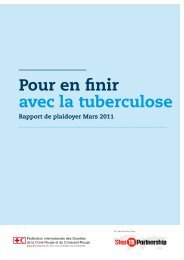Thailand - Stop TB Partnership
Thailand - Stop TB Partnership
Thailand - Stop TB Partnership
You also want an ePaper? Increase the reach of your titles
YUMPU automatically turns print PDFs into web optimized ePapers that Google loves.
on resources from the Global Fund to Fight AIDS, Tuberculosis and Malaria. The reliance<br />
on outside funding raises concerns about the sustainability of these aspects of the <strong>TB</strong><br />
program. 24 Due to budget shortfalls, many planned NTP training activities could not be<br />
implemented at the provincial and district levels in 2004. The emphasis on primary care<br />
has also had a detrimental effect on such core NTP activities as program monitoring and<br />
evaluation, as well as case recording and reporting. 25<br />
While some patients like the new universal coverage scheme, others have expressed<br />
frustration. For instance, one representative from a network of people living with HIV/AIDS<br />
asserted that referring patients to the hospital rather than to a local <strong>TB</strong> center has reduced<br />
accessibility to <strong>TB</strong> services.<br />
Political commitment<br />
I don’t think the government views <strong>TB</strong> as a threat. [T]here’s an inherent<br />
faith that a rising tide of better healthcare in general will lift all boats<br />
— [that] <strong>TB</strong> will progressively be eliminated along with other developing<br />
country diseases . . . [while] HIV garners such high-profile activism that<br />
it’s hard to shut the door on it. . . .<br />
—Jay Varma, section chief for <strong>TB</strong> Prevention and Control of the<br />
<strong>Thailand</strong>–U.S. Collaboration (TUC) 26<br />
The Thai government has demonstrated a high level of political commitment to <strong>TB</strong> control<br />
activities and implementation of the WHO-recommended DOTS strategy. By joining<br />
other high-burden country governments in adopting the Amsterdam Declaration to <strong>Stop</strong> <strong>TB</strong><br />
in 2000, the government embraced the global <strong>TB</strong> control targets of 70 percent case detection<br />
and 85 percent treatment success. In 2003, the MoPH declared <strong>TB</strong> to be one of five<br />
“priority diseases.” (The other priority diseases are HIV/AIDS, malaria, heart diseases,<br />
and diarrhea.) 27<br />
However, some observers assert that there is still insufficient political recognition<br />
of the persistence and severity of <strong>TB</strong> as a public health threat. According to the leader of one<br />
faith-based group, the general perception among political leaders as well as in Thai society<br />
is that <strong>TB</strong> has been completely eradicated. 28<br />
Political commitment to <strong>TB</strong> control is particularly weak at the regional, provincial,<br />
and district levels, where officials often place higher priority on other health issues such<br />
as dengue fever, avian flu, and diarrhea. Budget reallocation has exacerbated this trend.<br />
Resources formerly devoted to specialized <strong>TB</strong> control activities and staffing are now part of<br />
PUBLIC HEALTH WATCH MONITORING REPORTS 41


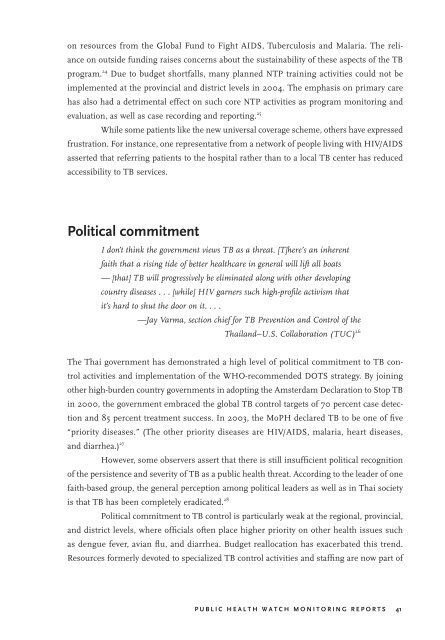
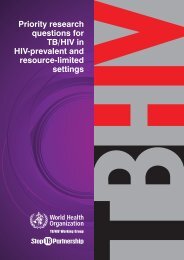
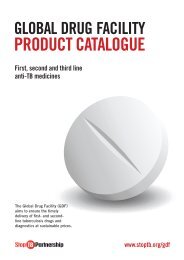
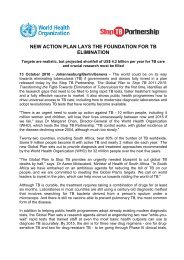
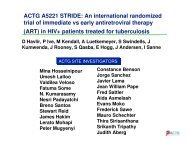
![Global Drug Facility Annual Report 2011 [.pdf] - Stop TB Partnership](https://img.yumpu.com/26788745/1/184x260/global-drug-facility-annual-report-2011-pdf-stop-tb-partnership.jpg?quality=85)

![Concept note on national stop TB partnership [.pdf]](https://img.yumpu.com/26788741/1/184x260/concept-note-on-national-stop-tb-partnership-pdf.jpg?quality=85)

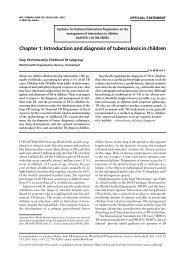
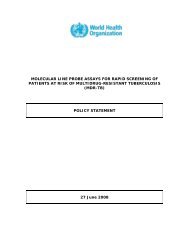
![2005 and Challenges for 2006 - 2015 [.pdf] - Stop TB Partnership](https://img.yumpu.com/26788674/1/190x245/2005-and-challenges-for-2006-2015-pdf-stop-tb-partnership.jpg?quality=85)
![Brochure (French) [.pdf] - Stop TB Partnership](https://img.yumpu.com/17234792/1/190x91/brochure-french-pdf-stop-tb-partnership.jpg?quality=85)

